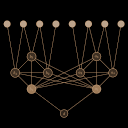although wayfinding is not as simple as map reading, it's still a skill you are already surprisingly good at. most of the ways in which you are not good at wayfinding are because you don't have a good map of the territory or because you find yourself in situations more complicated than those your ancestors evolved to handle. but because you already have excellent natural skills, we should look for ways to amplify them so that they work in the modern world.
this is, in essence, the whole story on wayfinding: the rest is just details.
but details are never 'just' details: they're the information you need to know. so let's begin by considering the things you are already good at in terms of wayfinding. the core of your skills boil down to these:
- you can focus your attention
- you can automatically prioritize
- you can hold thoughts in your mind
- you can remember old thoughts
you may not appreciate how amazingly good you are at these processes because you regularly hit their limits, but consider that all the time every day you make millions of decisions by automatically and unconsciously prioritizing possible future actions, base those priorities on what you are thinking and what you have thought in the past, and then execute on those decisions without being constantly distracted by the hundreds of bits of sensory input you receive each second. most of the universe, and even most living things, can't do that.
why do you sometimes drink water? not ultimately, but proximally how do you come to drink water? first, your body senses a lack of water through one of many possible mechanisms, so let's suppose here that your mouth is dry. this produces a 'thirsty feeling' thought about needing to drink water. remembering there is a glass of water near you, you choose (even if it happens below the level of consciousness) to lift the glass of water and take a sip. while drinking this water you are automatically ignoring most of your sensory input to focus only on the senses you need to help you take the drink. you continue drinking until the 'thirsty feeling' thought is prioritized under some other thought, like the 'take a breath' thought, at which point the choice process has already begun again.
this story about water drinking is highly stylized: there are many details excluded, mostly because we don't even understand all the details. but the point remains that you have an incredible ability to make complex choices based on a massive amount of information. to the extent you can get better at wayfinding, we'll be looking for ways to take these natural skills and build something more powerful out of them.
